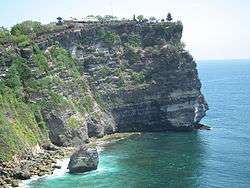Uluwatu Temple
| Pura Luhur Uluwatu | |
|---|---|
 | |
| Name | |
| Other names | Pura Uluwatu |
| Geography | |
| Coordinates | 8°49′44″S 115°5′7″E / 8.82889°S 115.08528°ECoordinates: 8°49′44″S 115°5′7″E / 8.82889°S 115.08528°E |
| Country | Indonesia |
| State/province | Bali |
| District | Kuta South |
| Locale | Uluwatu |
| Culture | |
| Primary deity | Sang Hyang Widhi Wasa as Rudra |
| History and governance | |
| Date established | 11th century |
Uluwatu Temple (Indonesian: Pura (Luhur) Uluwatu) is a Balinese sea temple (pura segara) in Uluwatu (Kuta South, Badung). The temple is regarded as one of the sad kahyangan and is dedicated to Sang Hyang Widhi Wasa in his manifestation as Rudra.[1]
History and etymology
The temple (pura in Balinese) is built at the edge (ulu) of a 70 meter high cliff or rock (watu) projecting into the sea.[2] In folklore, this rock is said to be part of Dewi Danu's petrified barque.[1]
Though a small temple was claimed to have existed earlier, the structure was significantly expanded by a Javanese sage, Empu Kuturan in the 11th Century. Another sage from East Java, Dang Hyang Nirartha is credited for constructing the padmasana shrines and it is said that he attained moksha here, an event called ngeluhur ("to go up") locally. This has resulted in the temple's epithet Luhur.[1]
Monkeys
The temple is inhabited by monkeys, who are notorious for snatching visitors' belongings. They can usually be persuaded into trading the items for fruit, although this only encourages them to steal more.
References
- 1 2 3 Davison, Julian (1999). Balinese Temples. Periplus Editions (HK) Limited. p. 30. ISBN 978-962-593-196-8.
- ↑ "Etymology and description".
Further reading
- Julian Davison, Nengah Enu, Bruce Granquist, Luca Invernizzi Tettoni (2003) Introduction to Balinese architecture (Illustrated by Nengah Enu, Bruce Granquist) Tuttle Publishing, ISBN 0-7946-0071-9, ISBN 978-0-7946-0071-6
External links
| Wikimedia Commons has media related to Pura Luhur Uluwatu. |